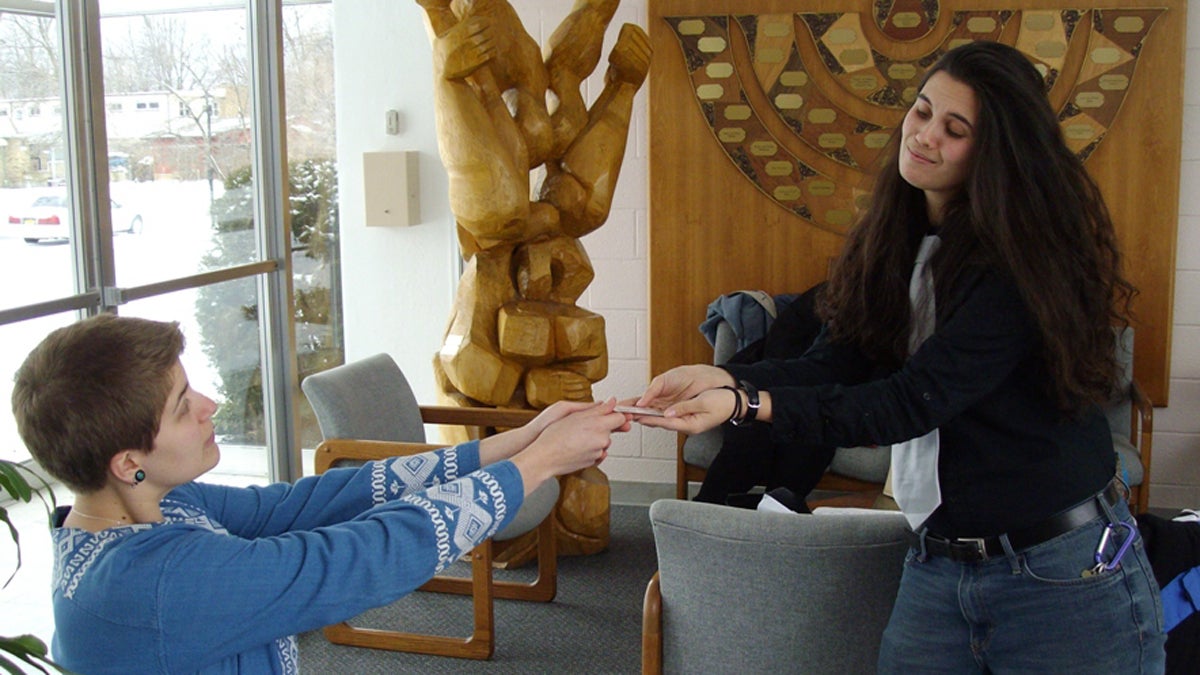Popping the question: ‘Darling, will you share my health insurance?’

Rayna, kneeling, offers Ethan a health insurance card in the lobby of their synagogue in Buffalo, NY, fewer than 50 feet from where they were legally wed. (Image courtesy of Ethan Czuy Levine)
Just over six years into our relationship, I propositioned my partner, Rayna, with a sham marriage. Neither of us was the marrying kind. The ongoing debates concerning same-sex and different-sex marriage often seemed to bypass our relationship.
Speak Easy is seeking new voices with fresh perspectives on same-sex marriage. Is there a story not being told? Do you have an opinion or personal experience you haven’t seen represented? Email speakeasy@whyy.org to submit your thoughtful rumination.
—
Just over six years into our relationship, I propositioned my partner, Rayna, with a sham marriage. Neither of us was the marrying kind. The ongoing debates concerning same-sex and different-sex marriage often seemed to bypass our relationship.
I was a transgender man with an F on my birth certificate and an M on my New York State driver’s license; Rayna was a genderqueer person, identifying neither as a man nor as a woman, with F’s on both documents — hardly the poster family for gay marriage, even among some gay marriage advocates. We were (and are) best friends with a mutual lifelong commitment, but lacked interest in state involvement. Bottom line, we viewed marriage as a last resort means to a handful of practical ends: joint tax filing, health care proxies, and the like.
The last resort
In December of 2011, just a few months after New York legalized same-sex marriage, some unfortunate encounters with state-subsidized health care sparked my interest in that last resort.
I had been working as an adjunct professor at two schools. I carried the equivalent of a fulltime teaching load, but lacked access to benefits. To fill that void, I opted to pay $300 for state-subsidized health insurance. Then I picked up a third school, which pushed me over the annual limit for subsidized care (and would have more than doubled the monthly payment). I also received a bill for $430 worth of blood tests, and learned that only $9 would be covered by insurance.
In an ideal world, I would have signed up for more affordable public health care, and continued along as usual. Lacking that option, and having a partner whose full-time job offered family benefits to legal spouses, I chose to marry my way in. We tied the knot a few days before my state subsidy ran out.
Navigating marriage and state lines
Insurance forms have been surprisingly easy to navigate. Our encounters with tax forms, on the other hand, have grown awkward. Rayna and I remain female-assigned on our birth certificates. We consequently qualify as same-sex partners.
Last year we filed separate federal tax returns (because of DOMA) and a joint return for New York State. We moved to Philadelphia in September 2012, but didn’t make enough in the remaining months to file additional state returns. This upcoming tax season, we will file a joint federal return (thanks, Supreme Court!), and separate state returns because Pennsylvania doesn’t recognize our New York union.
Coming up on my second wedding anniversary — it’s sometime in late January, but neither Rayna nor I can ever seem to remember the exact date — I am still struck by the changes that friends and relatives expected to see in us. We were told, over and over, that “marriage changes everything.” We were told that our relationship would reach a new level, that it would “become serious” through state involvement.
Yet, in all honesty, beyond taxes and benefit sharing, nothing has changed. We do not spend more or less time together, we do not love each other any more or any less, and we do not divide household tasks any differently.
As far as language goes, Rayna and I continue to refer to one another as partners. We do not say “spouse” unless we are actively discussing marriage. We also tend to avoid gendered relationship terms, marital or otherwise. Words like “husband” and “wife” seem to reinforce the fact that non-binary genders remain legally and socially unrecognized. I could be described as Rayna’s husband, and as having been Rayna’s boyfriend, but what counterparts are there? Was Rayna my genderqueerfriend? Is Rayna my legal genderqueer? My husbwife? Would it be fair to ask that anyone think of me as a husband, knowing that terms like “husband,” “wife,” “same-sex marriage,” and “different”-sex marriage leave my partner out?
I still think of my marriage as a sham. Rayna and I remain best friends, are still in love, and are still planning to spend our lives together. But I didn’t marry Rayna for love. I didn’t even marry Rayna for recognition. I married Rayna because my insurance subsidy ran out.
In the absence of universal healthcare — which, in all seriousness, is the only way to ensure that all queer and trans people may access healthcare — marriage seemed like the best option. I count myself lucky that I had a partner whose fulltime job provided a means toward these benefits. Others with similar needs, who happen to be unpartnered or whose partners lack shareable benefits, remain at the mercy of healthcare policy.
—
Ethan Levine is a graduate student studying sexuality, gender, and social policy at Temple University.
WHYY is your source for fact-based, in-depth journalism and information. As a nonprofit organization, we rely on financial support from readers like you. Please give today.

